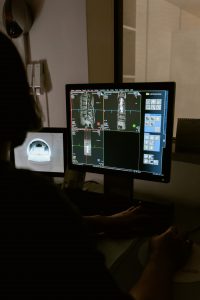Ultrasound technicians spot the signs of life-threatening diseases. They introduce parents to their children through pictures. The images they create are important to doctors and patients alike.
Where’s what you need to know if you’re considering a career in diagnostic medical sonography.
What is Diagnostic Medical Sonography?
Diagnostic medical imagery has transformed the world of medicine. This technology allows technicians to see the inside of the body. Ultrasounds use high-frequency waves rather than radiation, making the technology safe to use on patients. Ultrasound images help doctors diagnose medical problems and figure out treatments.
Are Ultrasounds and Sonograms the Same Thing?
No.
An ultrasound is a procedure that creates a sonogram. The sonogram is the image that helps doctors diagnose medical issues.
What Do Ultrasound Technicians Do?
Ultrasound technicians use a handheld device over the patient’s skin or inside the patient. Before the procedure, the technicians rub a gel on the patient’s skin. This device, known as a transducer, uses sound waves to produce images.

- Uterus: The best-known use of ultrasound technology. Pregnancy ultrasounds help doctors monitor fetal development and determine a due date. Ultrasounds are important for spotting abnormalities in the fetus. When health concerns are spotted early, doctors can spot the problem and treat them earlier.
- Heart: Patients that have chest pain or difficulty breathing are good candidates for echocardiograms. These ultrasound images allow doctors to identify problems with heart chambers and valves.
- Bones: Musculoskeletal sonography creates pictures of bones, tendons, and soft tissues. These images are often used to address short-term problems such as muscle sprains and tears. However, they can also catch long-term medical issues, including arthritis and osteoporosis.
- Blood Vessels: Vascular ultrasounds allow doctors to see blood flow. Doctors use sonogram technology to spot blockages, blood clots, and enlarged arteries. These images help doctors determine whether a patient is a good candidate for medical procedures that graft or bypass blood vessels.
- Breasts: Patients with a family history of breast cancer need to check for lumps. Ultrasounds can detect cancer early on, allowing doctors to provide early intervention. These images also detect non-cancer abnormalities such as cysts.
What’s The Job Outlook for Diagnostic Medical Sonographers?
Looking for a growing career? You’re in luck.
The Bureau of Labor Statistics reports that medical sonography careers are expected to grow by 14% percent between 2020 and 2030. This job growth reflects a job growth trend in medical careers. The aging baby boomer population needs ultrasound technicians to detect medical problems such as blood clots and tumors. New professionals are also needed to replace workers who are retiring or changing careers.
What Skills Do Ultrasound Technicians Have?
Medical sonographers combine technical expertise with people skills. Here are some skills that will help you strike the perfect balance:
 An Eye for Detail
An Eye for Detail
Sonography is all about the details. Medical sonographers need to notice when something is off so that they can catch medical abnormalities. They need to examine sonography images closely to determine which issue a patient could have. Being detail-oriented is also important for organizing medical records.
Ability to Operate Medical Equipment
Enrollment in an ultrasound program is crucial for understanding how the technology works. These programs introduce you to experienced professionals who will guide you in how to use the equipment. Using sonography equipment properly is crucial to accurately diagnose medical issues.
Interpersonal Skills
Many of your patients will feel negative emotions after receiving a negative test result. Calming them down and providing a listening ear makes a difference, both with patients and at the workplace.
Strong interpersonal skills also strengthen relationships with coworkers. Clear communication helps doctors understand sonography images. Knowing when to show compassion and when to be serious helps you strike the right tone with coworkers.
Ability to Perform Physical Tasks
Ultrasound technicians spend a lot of time on their feet. They need to be comfortable standing for long periods and pushing heavy equipment. Working in sonography also requires dexterity to operate medical equipment.
Grit
Medical sonographers are mentally tough. They’re the rock patients lean on during tough times. Sonographers often work with gravely ill patients and see tough medical images. They must learn to cope. Their patients depend on their mental strength.
How to Become an Ultrasound Technician
Want to play a crucial role on the medical team? Here are the steps you’ll need to take:
 Earn a High School Diploma
Earn a High School Diploma
Ultrasound technicians need a high school diploma to enroll in certificate programs. High school is the perfect opportunity to skill-build through volunteering. Dedicating time at clinics or nursing homes will help you understand and empathize with your patients later.
Complete an Ultrasound Technician Training Program
Ultrasound technicians need to understand how to operate ultrasound equipment and analyze the images they produce. These skills are developed in the classroom and labs of sonography programs. You’ll also gain real-world experience through internships.
Take a Certification Exam
Many states require ultrasound technicians to have a license from the American Registry for Diagnostic Medical Sonography (ARDMS). Although this certification isn’t required in Florida, it’s still preferred by most employers. The techniques and knowledge students learn in their ultrasound program prepare them for this exam.
Continue to Learn
Your learning doesn’t end when your program does.
Ultrasound technology continues to evolve. Your workplace will likely offer training sessions and healthcare seminars. Take these as an opportunity to grow.
Take the time to talk to and learn from your coworkers. An experienced mentor can provide valuable feedback, training, and networking opportunities.
Ready to Start Ultrasound Technician Training?
You want to spend every day working with innovative medical equipment. You’re compassionate and give patients comfort during tough times. You’ve got an eye for fine detail.
If this sounds like you, then you’re ready to earn an Associate’s Degree in Diagnostic Medical Sonography from FVI. During this two-year program, you’ll build the skills healthcare employers are seeking, including:
- Anatomy and Pathology Knowledge
- Patient Care
- Operate Ultrasound Technology
Want to learn more? Visit our website to find out about our ultrasound technician training program.
[wpu_silo links=’21’ show_thumbnails=’false’]



 An Eye for Detail
An Eye for Detail
 Earn a High School Diploma
Earn a High School Diploma


